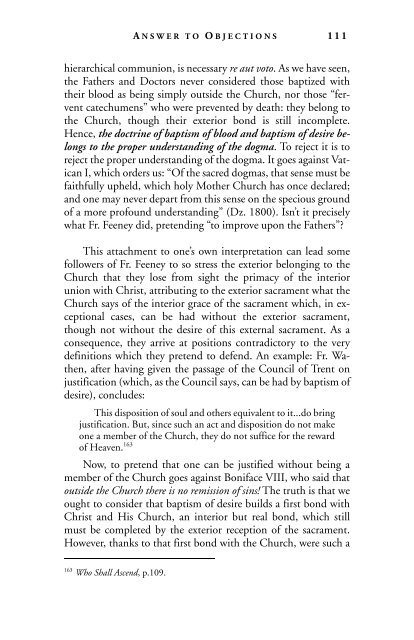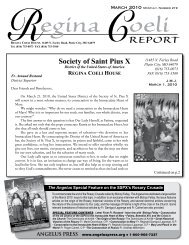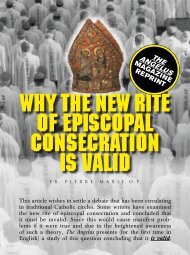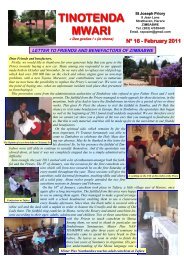Is Feeneyism Catholic? - Society of St. Pius X
Is Feeneyism Catholic? - Society of St. Pius X
Is Feeneyism Catholic? - Society of St. Pius X
Create successful ePaper yourself
Turn your PDF publications into a flip-book with our unique Google optimized e-Paper software.
A NSWER TO OBJECTIONS 111<br />
hierarchical communion, is necessary re aut voto. As we have seen,<br />
the Fathers and Doctors never considered those baptized with<br />
their blood as being simply outside the Church, nor those “fervent<br />
catechumens” who were prevented by death: they belong to<br />
the Church, though their exterior bond is still incomplete.<br />
Hence, the doctrine <strong>of</strong> baptism <strong>of</strong> blood and baptism <strong>of</strong> desire belongs<br />
to the proper understanding <strong>of</strong> the dogma. To reject it is to<br />
reject the proper understanding <strong>of</strong> the dogma. It goes against Vatican<br />
I, which orders us: “Of the sacred dogmas, that sense must be<br />
faithfully upheld, which holy Mother Church has once declared;<br />
and one may never depart from this sense on the specious ground<br />
<strong>of</strong> a more pr<strong>of</strong>ound understanding” (Dz. 1800). <strong>Is</strong>n’t it precisely<br />
what Fr. Feeney did, pretending “to improve upon the Fathers”?<br />
This attachment to one’s own interpretation can lead some<br />
followers <strong>of</strong> Fr. Feeney to so stress the exterior belonging to the<br />
Church that they lose from sight the primacy <strong>of</strong> the interior<br />
union with Christ, attributing to the exterior sacrament what the<br />
Church says <strong>of</strong> the interior grace <strong>of</strong> the sacrament which, in exceptional<br />
cases, can be had without the exterior sacrament,<br />
though not without the desire <strong>of</strong> this external sacrament. As a<br />
consequence, they arrive at positions contradictory to the very<br />
definitions which they pretend to defend. An example: Fr. Wathen,<br />
after having given the passage <strong>of</strong> the Council <strong>of</strong> Trent on<br />
justification (which, as the Council says, can be had by baptism <strong>of</strong><br />
desire), concludes:<br />
This disposition <strong>of</strong> soul and others equivalent to it...do bring<br />
justification. But, since such an act and disposition do not make<br />
one a member <strong>of</strong> the Church, they do not suffice for the reward<br />
<strong>of</strong> Heaven. 163<br />
Now, to pretend that one can be justified without being a<br />
member <strong>of</strong> the Church goes against Boniface VIII, who said that<br />
outside the Church there is no remission <strong>of</strong> sins! The truth is that we<br />
ought to consider that baptism <strong>of</strong> desire builds a first bond with<br />
Christ and His Church, an interior but real bond, which still<br />
must be completed by the exterior reception <strong>of</strong> the sacrament.<br />
However, thanks to that first bond with the Church, were such a<br />
163 Who Shall Ascend, p.109.











